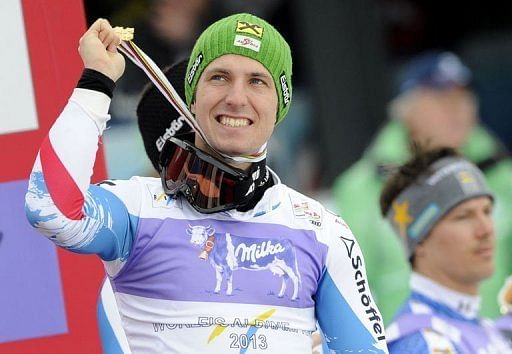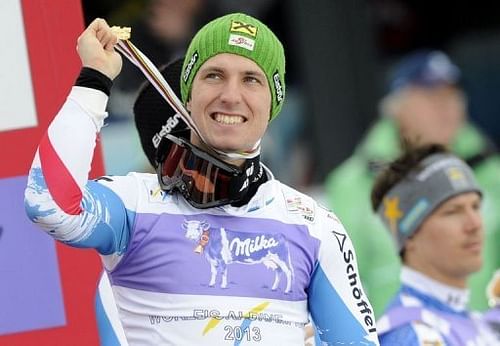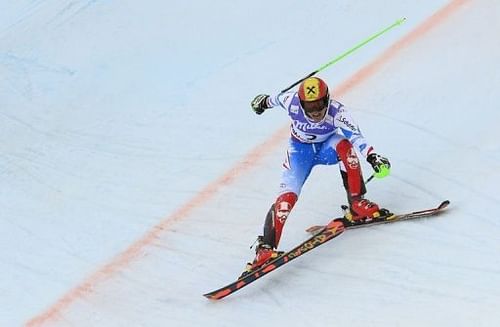
Ski-mad Austria goes from depths to jubilation
SCHLADMING, Austria (AFP) –

Austria’s Marcel Hirscher poses with his gold medal on the podium after the men’s slalom at the 2013 Ski World Championships in Schladming, Austria on February 17, 2013. The world championships ended on a high for ski-mad Austria with a smashing final slalom gold by young star Hirscher.
Newspaper front pages said it all: from confidence to despair, hope and finally jubilation, they spanned the whole range of emotions that animated ski-mad Austria at the World Ski Championships.
Ahead of the two-week event, it was already clear the ski nation would struggle to equal its 2011 medal sweep when the Austrian women took five medals, including four gold, with two more from the men.
In the end, with seven individual medals and team gold, fears of a historic debacle were thankfully left by the wayside, and the world championships ended on a high with a smashing final slalom gold by young star Marcel Hirscher.
Austria had got off to a slow start, taking its first medal only on the fourth day of competition and with zero podium finishes in the speed events, including the prestigious downhill.
And this despite a 27-strong team including two Olympic champions, eight world champions, three overall World Cup winners and a raft of crystal globe winners.
Unrealistic targets by ski officials and the pressure of performing on home snow weighed on many of the athletes, as could be seen by their relief even when they bagged silver or bronze.
“The start wasn’t good for us without medals so the pressure was always more and more,” pin-up and medal-favourite Anna Fenninger said after her giant slalom bronze.
“It was a really difficult world championship.”
Following her surprise super-combined title in Garmisch in 2011, much of Austria’s hopes rode on her shoulders and those of teammate and media darling Hirscher.

Austria’s Marcel Hirscher crosses the finish line to take gold in the men’s slalom at the 2013 Ski World Championships in Schladming, Austria on February 17, 2013. The world championships ended on a high for ski-mad Austria with a smashing final slalom gold by young star Hirscher.
But this proved too much for the 23-year-old Fenninger, who failed to finish the super-G and super-combined, and took a paltry 11th place in the downhill.
Only a quick trip back home halfway through the championships helped her “hit the reset button” and ascend the podium.
Hirscher also noted after his giant slalom silver that “all those guys in the media didn’t make it easy for me”.
Even his gold medal in the team event “was not what people wanted from me. The expectations were immensely high, and everyone said minimum (individual) silver”.
The immense success of US and French skiers, who together took six gold medals in 11 events, made Austria’s lack of trophies all the more obvious.
Ski Federation President Peter Schroecksnadel, who contributed to high expectations by predicting a medal in each discipline, had mixed feelings at the end of the two-week ski fest.
“The team could have done better. But at home, it’s always very very difficult,” he told AFP.
“In Austria, it’s always like that: if you don’t win, everyone’s unhappy.”
In the end, the initial lack of success probably helped lift some pressure off the athletes.
“When the expectations fell after the first week, everyone was happy with a bronze medal,” Schroecksnadel said, adding that with the final tally, “we’re very happy”.
Gold in the team event seemed to be the trigger for success and medals followed in every race.
But the crowning moment was Hirscher’s intrepid slalom gold, accompanied by teammate Mario Matt’s bronze, which lifted Austria to second place in the medals table, just behind the United States.
“Maybe four million watched this race and 40,000 were here in Schladming. If I’d made a mistake, oh my god, they would have killed me!” Hirscher laughed.
“Hirscher saves world championships for Austria!” the daily Kurier meanwhile rejoiced after the long-awaited gold was in the bag.